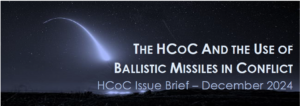Newsletter
Issue #1
June 2023
Read news of the Code, updates on our recent activities and latest information about ballistic missile tests and space launches.
CONTENTS
Latest HCoC News
- Annual Regular Meeting in Vienna
- Fifth EU Council Decision in Support of the HCoC
- Looking Back on the Nigerian Chairmanship of the HCoC
News about the Project
- Side-Event in Vienna on Upcoming Trends For Ballistic Missile Non-proliferation
- Youth Group Creation
- Regional Seminar in Nigeria
News about the Ballistic Missiles & Launchers
- North Korea Tests a Solid-Fuel ICBM
- Suspension of the New Start Treaty
Selected Missiles Tests
Selected SLV Launches
Information and contacts



